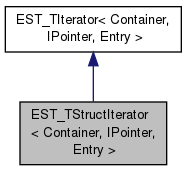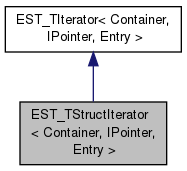#include <include/EST_TIterator.h>


Public Types | |
|
typedef EST_TIterator < Container, IPointer, Entry > | Iter |
 Public Types inherited from EST_TIterator< Container, IPointer, Entry > Public Types inherited from EST_TIterator< Container, IPointer, Entry > | |
|
typedef EST_TIterator < Container, IPointer, Entry > | Iter |
| Name for an iterator like this. | |
Public Member Functions | |
| EST_TStructIterator () | |
| Create an iterator not associated with any specific container. | |
| Iter & | operator= (const Iter &orig) |
| Copy an iterator by assignment. | |
| EST_TStructIterator (const Container &over) | |
| Create an iterator ready to run over the given container. | |
| const Entry * | operator-> () const |
 Public Member Functions inherited from EST_TIterator< Container, IPointer, Entry > Public Member Functions inherited from EST_TIterator< Container, IPointer, Entry > | |
| EST_TIterator () | |
| Create an iterator not associated with any specific container. | |
| EST_TIterator (const Container &over) | |
| Create an iterator ready to run over the given container. | |
| Iter & | operator= (const Iter &orig) |
| Copy an iterator by assignment. | |
| Iter & | operator= (const Container &over) |
| Assigning a container to an iterator sets it ready to start. | |
| void | begin (const Container &over) |
| Set the iterator ready to run over this container. | |
| void | beginning () |
| Reset to the start of the container. | |
| bool | has_more_elements () const |
| True if there are more elements to look at. | |
| bool | at_end () const |
| True when there are no more. | |
| operator int () const | |
| void | next () |
| Next moves to the next entry. | |
| Iter & | operator++ () |
| The increment operator does the same as next. | |
| Iter | operator++ (int dummy) |
| const Entry & | current () const |
| Return the element currently pointed to. | |
| const Entry & | operator* () const |
| The * operator returns the current element. | |
| const Entry & | next_element () |
| Return the current element and move the pointer forwards. | |
| unsigned int | n () const |
| Return the current position. | |
Additional Inherited Members | |
 Protected Attributes inherited from EST_TIterator< Container, IPointer, Entry > Protected Attributes inherited from EST_TIterator< Container, IPointer, Entry > | |
| Container * | cont |
| The container we are looking at. | |
| unsigned int | pos |
| Position in the structure. May or may not be useful. | |
| IPointer | pointer |
Template class defining interface to an iterator, i.e an object which returns elements from a structure one at a time.
This is template is usually hidden in the declaration of the container classes with a typedef for Entries providing a more convenient name for the iterator. However the interface is that defined here.
We support two interfaces, a pointer like interface similar to specialised iteration code elsewhere in the speech tools library and to the iterators in the C++ standard template library and an interface similar to that of Enumerations in Java.
<programlisting arch="c++"> MyContainer::Entries them;
for(them.begin(container); them; them++) { MyContainer::Entry &it = *them; // Do Something With it }</programlisting>
<programlisting arch="c++"> MyContainer::Entries them;
them.begin(container); while (them.has_more_entries()) { MyContainer::Entry &it = them.next_entry(); // Do Something With it }</programlisting>
Definition at line 74 of file EST_TIterator.h.